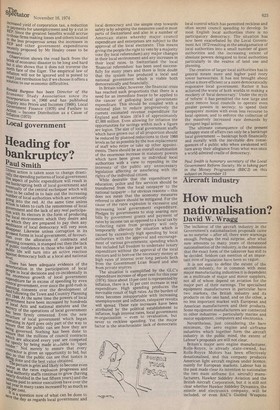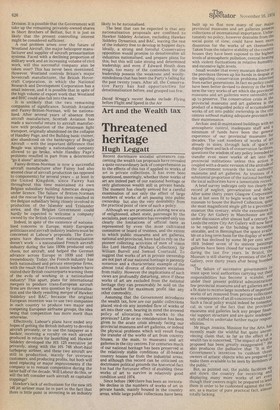How much nationalisation?
David W. Wragg The inclusion of the aircraft industry in the Government's nationalisation proposals came as no surprise — after all, there were warnings enough. Perhaps the real surprise, after what now amounts to many years of threatened nationalisation of the industry, is the admission that the exact form of the takeover has still to be decided. Seldom can mention of an important item of legislation have been so vague.
It is not easy to define the extent of the aircraft industry, for in common with most major manufacturing industries it is dependent on a multitude of major and minor suppliers, not all of whom depend on aviation for the major part of their earnings. The specialised equipment manufacturers in particular have two markets, the British industry and its products on the one hand, and on the other, a no less important market with European and American manufacturers and their products. Some equipment manufacturers are connected to other industries — particularly marine and motor equipment, computers and electronics.
Nevertheless, just considering the bare minimum, the aero engine and airframe industries which together form the aircraft industry in the public mind, the extent of Labour's proposals are still not clear. Britain's major aero engine manufacturer, Rolls-Royce, is already . state-owned, but Rolls-Royce Motors has been effectively denationalised, and this company produces American light aircraft engines under licence, mainly for European markets. Labour has in the past made clear its intention to nationalise the two main airframe (i.e. aircraft) manufacturers, Hawker Siddeley Aviation and the British Aircraft Corporation, but it is still not clear whether Hawker Siddeley Dynamics, the missile and electronics company, will be included, or even BAC's Guided Weapons Division. It is possible that the Government will take up the remaining privately-owned shares in Short Brothers of Belfast, but it is just as likely that the present controlling interest might be considered sufficient.
A real problem arises over the future of Westland Aircraft, the major helicopter manufacturer and supplier of aircraft pressurisation systems. Faced with a declining proportion of military work and an increasing volume of civil work, will this successful company also be taken over? This has never been mentioned. However, Westland controls Britain's major hovercraft manufacturer, the British Hovercraft Corporation, in which the National Research and Development Corporation has a small interest, and it is possible that in spite of the high volume of export work that Westland and BHC could also fall into the net.
It is unlikely that the two remaining companies of significance, Scottish Aviation and Fairey-Britten-Norman, will be nationalised. After several years of absence from aircraft manufacture, Scottish Aviation has made a successful return to aircraft manufacture with production of the Jetstream light transport, originally abandoned on the collapse of Handley Page, and the Bulldog basic trainer, also abandoned on the bankruptcy of Beagle Aircraft — with the important difference that Beagle was already a nationalised company allowed to go broke, while Handley Page's problems resulted in part from a determined "go it alone" attitude.
Fairey-Britten-Norman is now a successful aircraft manufacturer after Fairey had also steered clear of aircraft production (as opposed to components) for several years — at least in the United Kingdom, since Fairey has throughout this time maintained its own Belgian subsidiary building American designs under licence. The failure of Britten-Norman and the rescue by Fairey has since resulted in the Belgian subsidiary being closely involved in production of the Islander and Trislander series, and the Belgian Government could hardly be expected to welcome a company owned by the British Government!
Indeed, in spite of the existence of nationalised concerns in Europe, many European politicians and aircraft industry leaders must be concerned at Labour's proposals. The Europeans have discovered that nationalisation doesn't work — a nationalised French aircraft industry during the late 1930s produced only chaos, not aircraft, and helped the German advance across Europe in 1939 and 1940 tremendously. Today, the French industry has both nationalised and private enterprise firms, with the result that French union leaders have visited their British counterparts warning them of the evils of working in a nationalised industry! This apart, plans for international mergers to produce trans-European aircraft firms are thrown into question by nationalisation and the likely resulting merger of Hawker Siddeley and BAC, because the original European intention was to use two companies in each country to produce two major and competing European airframe groups, the idea being that competition has more merit than otherwise.
Effectively, Labour's plans have ended any hopes of getting the British industry to develop aircraft privately, or to use the taxpayer as a banker, receiving a royalty on each aircraft produced in return for launching aid, Hawker Siddeley developed the HS 125 executive jet privately, along with the HS 748 short-haul turboprop airliner, and these two aircraft are still in production, mainly for overseas customers, and producing profits, but both will need replacing or major improvements if the company is to remain competitive during the latter half of the decade. Will Labour do this, or will the left consider such aircraft as capitalist trappings?
Hawker's lack of enthusiasm for the new HS 146 jet airliner must lie in part in the fact that there is little point in investing in an industry likely to be nationalised.
The best that can be expected is that any nationalisation proposals are confined to Hawker Siddeley Aviation, excluding Hawker Siddeley Dynamics, and BAC, leaving the rest of the industry free to develop in happier days. Ideally, a strong and forceful Conservative opposition would promise to denationalise all industries nationalised, and prepare plans for this, but this will take strong and determined leadership; and even if Edward Heath does resign, too many of the contenders for the leadership possess the weakness and woollymindedness that has been the Party's failing for the past twenty years. After all, the Conservative Party has had opportunities for denationalisation before, and grasped too few.
David Wragg's recent books include Flying before Flight and Speed in the Air



































 Previous page
Previous page